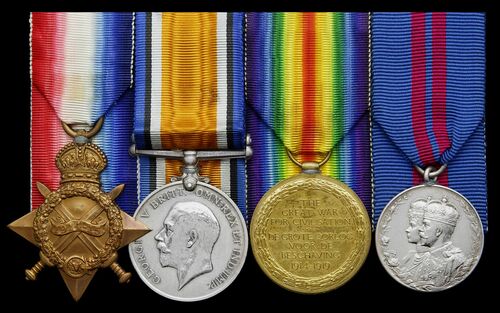
Auction: 24001 - Orders, Decorations and Medals
Lot: 94
(x) A most interesting campaign group of four awarded to Corporal J. P. Kay-Robinson, 5th Mounted Rifles and 8th South African Horse, the author of With Botha's Army: the Campaign to capture German South-West Africa
1914-15 Star (Cpl J. P. Kay-Robinson 5th M.R.); British War and South African Victory Medal (2Nd C/W.O. J. P. Kay-Robinson. 8th S.A.H.); Coronation 1911, mounted for display very fine (4)
J. P. Kay-Robinson wrote the book With Botha's Army, published in 1916 by George Allen & Unwin Ltd, London.
In August 1915, after the conclusion of the German South-West
campaign, Kay-Robinson approached the South African Department of Defence. He had served throughout the campaign with the Imperial Light Horse and now sought appointment as a campaign historian. With the campaign at an end and facing the prospect of a widening war – new contingents were being raised for service in East Africa and Western Europe – the defence authorities were pressed to formulate policy regarding an official, war history programme. A number of principles were now laid down. The first related to access, and particularly firsthand access to the archives generated during the war, and the associated security concerns. Any military-historical research, Colonel John Collyer, then Chief Staff Officer, informed the Secretary for Defence, would have to be done ‘under the strictest supervision.' Some would claim that that the professed ‘official’ nature of military records and their supposed inaccessibility was nothing other than an excuse to keep military documents ‘closed’. The second principle related to ability. A number of officials very much doubted – in view of the technical nature of military history – whether just any member of the public would ever be in a position to write such a narrative. Collyer even called for the exclusion of civilians from the writing of military history per se. Civilians, he argued, simply did not have the skills, the unique combination of education (although not necessarily university-based in his own case), the ability to search out a military matter and to write up the findings, and, most importantly, a thorough knowledge of the Defence organisation, its structure, ethic and the milieu in which it operates both in times of peace and war. At the very least, a civilian historian would have to be assisted and advised and, in 1915 when Robinson made inquiry, the staffs at Defence Headquarters were thought sufficiently busy without being taxed by pesky ‘civilian’ researchers and would not be able to render assistance until the war was over. Robinson’s credentials – he had served throughout the campaign with a Citizen Force regiment, the ILH – were seemingly deemed inadequate.
THE CAMPAIGN IN GERMAN SOUTH WEST AFRICA
In January 1915, still under command of Louis Botha, the South African Union Defence Force, made up of volunteers, invaded South West Africa along three routes. They followed the main railway lines due to the desert environment they were having to cross. To do this, they had to repair the lines the Germans destroyed as they withdrew. Louis Botha, possibly one of the greatest military leaders South Africa has had, chose to go across land having had wells and other infrastructure put in place as far as possible without arousing German suspicion. In this and the railway work he was ably supported by mining magnates, Thomas Cullinan and George Farrar, the latter losing his life on the job.
On 9 July 1915, the Germans finally surrendered having been pushed into a corner. The whole ‘lightning’ campaign saw only 26 days of action in the six months of renewed action. The remainder was taken up getting material and water to where it was needed. The German Governor, Dr Seitz had hoped for a conditional surrender pending the outcome in Europe, however, Botha succeeded in obtaining unconditional surrender.
Subject to 5% tax on Hammer Price in addition to 20% VAT on Buyer’s Premium.
Sold for
£1,000
Starting price
£270




